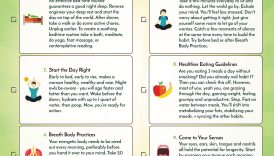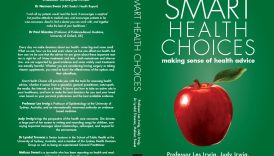The Journey to Better Health: A Guide to Kawana Living

Understanding the Concept of Kawana Living
Kawana Living is more than just a concept; it’s a lifestyle philosophy that emphasizes holistic well-being. It merges healthy living with the interconnectedness of body, mind, and environment. By embracing the principles of Kawana Living, individuals can cultivate a balanced and fulfilling life. For instance, many people who adopt this approach notice improvements not only in their physical health but also in their emotional and social well-being.
- The Journey to Better Health: A Guide to Kawana Living
- Understanding the Concept of Kawana Living
- Benefits of Embracing a Healthier Lifestyle
- Nutrition and Diet
- Importance of a Balanced Diet
- Superfoods for Optimal Health
- Physical Fitness
- Importance of Regular Exercise
- Fun Ways to Stay Active
- Mental Well-being
- Managing Stress and Anxiety
- Strategies for Improving Mental Health
- Sleep Health
- Importance of Quality Sleep
- Tips for Better Sleep
- Hydration and Detoxification
- Benefits of Staying Hydrated
- Detoxifying Your Body Naturally
- Social Connections
- Impact of Relationships on Health
- Building a Supportive Social Network
- Environmental Wellness
- Creating a Healthy Living Environment
- Sustainable Living Practices
- Self-Care Practices
- Importance of Self-Care
- Self-Care Activities for Better Health
Benefits of Embracing a Healthier Lifestyle
Transitioning to a healthier lifestyle can feel daunting, but the benefits are incredibly rewarding. Here are several advantages of embracing this change:
- Increased Energy Levels: Regular exercise and a balanced diet boost energy, making daily tasks easier.
- Improved Mood: Physical activity releases endorphins, which can elevate mood and reduce stress.
- Enhanced Longevity: Healthy habits contribute to a longer and more vibrant life.
- Better Relationships: When one feels good about themselves, it positively impacts interactions with others.
The journey to healthier living begins with small steps, often leading to profound changes over time.
Nutrition and Diet
Importance of a Balanced Diet
Building on the foundation of a healthy lifestyle, nutrition plays a critical role in achieving overall wellness. A balanced diet is crucial, as it provides the body with essential nutrients to function properly. Imagine waking up feeling energized, ready to tackle the day; this can often be attributed to what you consume. A balanced diet typically includes:
- Fruits and Vegetables: Aim for a colorful plate; different colors often indicate a range of nutrients.
- Whole Grains: Foods like brown rice and quinoa provide energy and fiber.
- Proteins: Include lean meats, beans, or plant-based options that help in muscle repair and growth.
- Healthy Fats: Incorporate avocados and nuts, which are beneficial for heart health.
Superfoods for Optimal Health
In the quest for better nutrition, superfoods have taken center stage. These foods are nutrient-dense and can have significant health benefits. Some popular superfoods include:
- Blueberries: Packed with antioxidants, they help combat free radicals.
- Kale: A fantastic source of vitamins A, C, and K, supporting immune function.
- Chia Seeds: Loaded with omega-3 fatty acids, providing heart health benefits.
Integrating these superfoods into daily meals can elevate one’s health journey and enhance overall well-being.
Physical Fitness
Importance of Regular Exercise
Continuing with the theme of a balanced lifestyle, regular exercise is a cornerstone of physical fitness and overall health. Engaging in physical activity not only helps in maintaining a healthy weight but also boosts mood, sharpens mental clarity, and enhances sleep quality. For instance, after incorporating a daily jogging routine, many individuals, just like Sarah, feel a significant uptick in their energy and focus throughout the day. The benefits of regular exercise include:
- Heart Health: Improves circulation and strengthens the heart.
- Muscle Strength: Increases muscle mass and bone density.
- Coordination and Balance: Enhances physical capabilities, reducing risks of falls.
Fun Ways to Stay Active
Staying active doesn’t have to be a chore—it can be fun! Finding enjoyable activities can make a world of difference. Here are some delightful ways to incorporate exercise into your routine:
- Dance Classes: From Zumba to ballet, dancing is a fun way to burn calories.
- Nature Walks: Explore beautiful trails while enjoying the great outdoors.
- Group Sports: Join a local soccer or basketball league for a sociable workout.
Choosing activities you love can transform exercise from a duty into a delightful part of your everyday life!
Mental Well-being
Managing Stress and Anxiety
Transitioning from physical fitness to mental well-being, it’s essential to recognize that our mental health is just as important as our physical health. In today’s fast-paced world, stress and anxiety can often feel overwhelming. Learning to manage these feelings is crucial for maintaining overall wellness. When Mark, a busy professional, implemented simple techniques like deep-breathing exercises, he noticed a significant reduction in his stress levels. Effective strategies for managing stress and anxiety include:
- Mindfulness Meditation: Practicing mindfulness helps bring awareness to the present moment, reducing anxious thoughts.
- Physical Activity: Regular exercise releases endorphins, which naturally reduce stress.
- Journaling: Writing down your thoughts can help clarify feelings and reduce anxiety.
Strategies for Improving Mental Health
In addition to managing stress, there are numerous strategies to enhance mental health:
- Seek Professional Help: Don’t hesitate to talk to a mental health professional if you need support.
- Build a Support Network: Surround yourself with positive relationships to foster emotional well-being.
- Engage in Hobbies: Pursuing interests or new activities can provide joy and alleviate stress.
Focusing on mental well-being can lead to a more balanced and fulfilling life, reinforcing the importance of a holistic approach to health.
Sleep Health
Importance of Quality Sleep
Shifting our focus from mental well-being, sleep health plays a critical role in maintaining overall wellness. Quality sleep is essential not only for physical recovery but also for mental clarity and emotional stability. For example, when Lisa began prioritizing her sleep, she noticed that her ability to focus improved significantly, enhancing her productivity at work. Quality sleep offers numerous benefits, including:
- Improved Memory: Sleep is vital for memory consolidation, helping to retain what you learn.
- Enhanced Mood: A good night’s rest can lead to a more positive outlook and reduced irritability.
- Stronger Immune System: Sleep helps your body repair itself and fight off illnesses.
Tips for Better Sleep
To achieve better sleep quality, consider implementing these strategies:
- Establish a Sleep Schedule: Going to bed and waking up at the same time each day helps regulate your body’s internal clock.
- Create a Relaxing Bedtime Routine: Activities like reading or gentle stretches can signal your body that it’s time to wind down.
- Limit Screen Time: Reducing exposure to screens at least an hour before bed can improve sleep quality.
By focusing on sleep health, one can unlock the benefits of improved well-being, making it an essential component of a balanced lifestyle.
Hydration and Detoxification
Benefits of Staying Hydrated
Moving from sleep health, staying hydrated is vital for maintaining optimal well-being. Water is often referred to as the elixir of life, and for good reason. When Michael started drinking more water throughout his day, he found his energy levels skyrocketed, and he felt more alert overall. The benefits of staying hydrated include:
- Enhanced Physical Performance: Proper hydration helps to maintain endurance and strength during physical activities.
- Improved Digestion: Water aids in breaking down food, facilitating optimal nutrient absorption.
- Better Skin Health: Staying hydrated can lead to clearer, more radiant skin by helping to flush out toxins.
Detoxifying Your Body Naturally
In addition to hydration, detoxification is essential for removing impurities from the body. Here are some natural ways to detoxify:
- Incorporate Fiber: Foods rich in fiber, like fruits, vegetables, and whole grains, promote healthy digestion and aid in toxin elimination.
- Drink Herbal Teas: Green tea and dandelion tea can help stimulate liver function and support detoxification.
- Add Fresh Juices: Juicing fresh greens or other vegetables can give your body a nutrient boost while flushing out toxins.
By focusing on hydration and natural detoxification, individuals can further enhance their journey toward a healthier lifestyle.
Social Connections
Impact of Relationships on Health
Transitioning from the importance of hydration and detoxification, social connections play a crucial role in overall well-being. Nurturing relationships can significantly impact both physical and mental health. For instance, when Sarah reconnected with her old friends, she noticed a marked improvement in her mood and stress levels. Research shows that strong social ties can reduce the risk of chronic diseases and even increase longevity. The ways relationships can affect health include:
- Emotional Support: Having someone to talk to can alleviate stress and anxiety, enhancing mental health.
- Lifestyle Influence: Friends can motivate physically, encouraging activities like group workouts or healthy eating habits.
- Sense of Belonging: Positive relationships foster a sense of community, which is essential for emotional well-being.
Building a Supportive Social Network
To cultivate a supportive social network:
- Join Clubs or Groups: Engage in activities that interest you, whether it’s a book club or a sports team.
- Volunteer Your Time: Helping others not only strengthens connections but also boosts your own mood.
- Stay Connected: Regular check-ins with friends and family can reinforce bonds and provide emotional support.
By prioritizing social connections, individuals can greatly enhance their emotional and physical health, creating a more balanced and fulfilling life.
Environmental Wellness
Creating a Healthy Living Environment
Continuing from the significance of social connections, it’s essential to recognize how our environment impacts our overall wellness. A healthy living environment not only promotes our physical health but also supports our mental well-being. When Jenna decided to declutter her home, she was amazed at how much lighter and more peaceful she felt. A clean space can enhance focus and reduce stress. Here are some ways to create a healthier living environment:
- Optimize Air Quality: Keep windows open for fresh air or invest in indoor plants to purify the air.
- Minimize Clutter: Organizing your space can create a more tranquil atmosphere and make daily tasks easier.
- Use Natural Products: Opt for eco-friendly cleaning supplies to reduce exposure to harmful chemicals.
Sustainable Living Practices
In addition to creating a healthy space, adopting sustainable living practices contributes to environmental wellness:
- Reduce, Reuse, and Recycle: Emphasize minimizing waste by recycling materials whenever possible.
- Conserve Energy: Simple actions like turning off lights and unplugging devices can lower energy consumption.
- Support Local: Purchase local produce to reduce carbon footprint and support your community.
By focusing on environmental wellness, individuals can enhance their quality of life while contributing positively to the planet.
Self-Care Practices
Importance of Self-Care
As we wrap up our discussion on environmental wellness, it’s critical to highlight the importance of self-care. In today’s fast-paced world, many tend to overlook their own needs, leading to burnout and fatigue. When Tom realized he hadn’t taken a day off for himself in months, he decided it was time to prioritize self-care. He quickly noticed that dedicating time for himself not only boosted his mood but also improved his overall productivity. Self-care is essential for various reasons:
- Restores Energy: Taking time out allows the mind and body to recuperate.
- Enhances Mental Health: Regular self-care practices can significantly reduce anxiety and depression.
- Boosts Self-Esteem: Engaging in activities that nourish you increases self-worth and happiness.
Self-Care Activities for Better Health
Integrating self-care activities into daily life can foster better health:
- Mindfulness and Meditation: Practicing mindfulness can help reduce stress and improve emotional well-being.
- Physical Activity: Regular exercise, whether it’s a brisk walk or yoga, is a fantastic self-care practice.
- Creative Outlets: Pursuing hobbies like painting or writing can serve as a therapeutic escape.
By embracing self-care, individuals can cultivate a more balanced, healthy lifestyle, ultimately enhancing their overall well-being.





